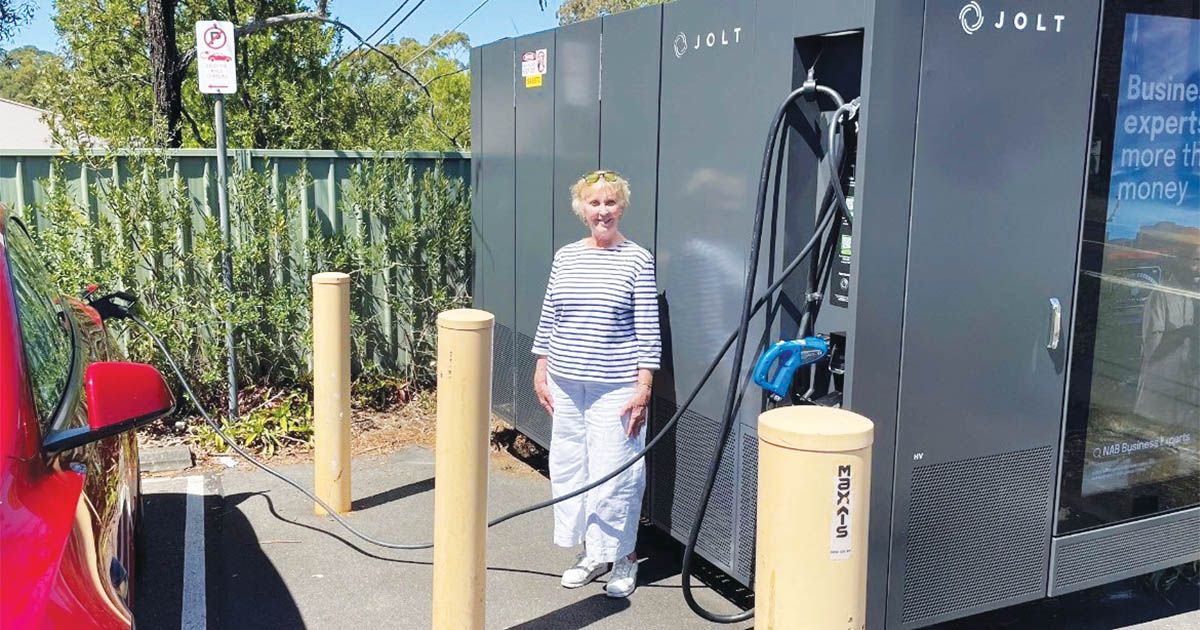Reducing carbon emissions is a difficult challenge in the Hornsby Shire, particularly in outer urban and rural areas where residents are dependent on private vehicles for daily commutes, due to limited public transport options. Dependence on fuel engine vehicles means increased carbon emissions thereby hindering targets for environmental sustainability.
Since implementation of the Hornsby Shire Council Climate Wise Hornsby Plan 2020, which identifies transport as the second largest contributor to greenhouse gas emissions in the Shire, the Council has undertaken strong initiatives to reduce corporate greenhouse gas emissions and meet its adopted 2050 Net Zero target.
We have actively prioritised collaborative opportunities to integrate renewable energy sources, such as electric vehicle EV charging infrastructure, into road transport networks and community spaces. EV uptake in the Shire has been strong, with well over 1,000 EV vehicles now owned by our Hornsby residents.
This quick uptake is also reflected nationally. The annual State of Electric Vehicles report (Electric Vehicle Council, June, 2023) notes the surge of EV sales in Australia has resulted in more EV’s being sold in the first half of 2023 than in all of 2022. The report also states EV’s have made up 8.4% of all new car sales for 2023 and public charging locations have increased by around 57%.
Availability of public high-power EV charging and private EV charging at home is a strong concern for us at Hornsby Council. Recent media images show desperate EV owners outside the Shire taking unusual steps to charge their cars on a public street. Methods used include stretching extension cords across public streets, footpaths, over fences and dangling cords from trees down to the car’s charging port. Such behaviour is risky, dangerous and a fire hazard.
At Hornsby Council, we have taken action to enhance accessibility of EV chargers within the Shire. In 2022, we adopted an Electric Vehicle Charging Stations on Public Land Policy to provide criteria to install, manage, maintain and remove EV charging infrastructure on public land for Shire residents who do not have EV charging off-street parking options. This policy should alleviate concerns regarding access to EV charging infrastructure and support reduction in carbon emissions.

Our Council worked with Ausgrid and JOLT Charge to install the 25th JOLT EV charger station in June, 2023, at Council’s Beecroft carpark off Wongala Crescent. All of JOLT’s chargers are powered by 100% Greenpower certified wind and solar energy.
JOLT was founded in 2018 by Doug McNamee, who grew up in the Hornsby area. JOLT’s business model provides DC fast electric vehicle public charging infrastructure, which is installed and operated at zero cost to landholders, with all costs covered by JOLT. JOLT provides free daily charging of up to 7kWh (40-50km of range) to consumers.
88.9% of residents and tenants within a 50-metre radius of the Beecroft site supported the JOLT proposal prior to its installation. The Beecroft JOLT EV Charger has provided over 750 hours of charging which has delivered over 90,000km worth of range to drivers (as at October 2023).
The JOLT EV charger at Beecroft also attracts visitors from outside the region. (In the attached photograph: The red Tesla EV car is being charged at the Beecroft JOLT charger. The Tesla had travelled from Wagga Wagga and its owners were charging their vehicle, then driving back to Wagga (534 kms) via the Sydney CBD).
There are presently five other EV charging stations available in retail locations across the Hornsby Shire. To view a map of available EV chargers in Hornsby Shire, visit https://electricvehiclecouncil.com.au/about-ev/charger-map
Council staff are now examining submissions made by residents following our resolution and public exhibition in October 2023, of draft amendments to the Hornsby Development Control Plan.
These amendments are designed to identify and require minimum EV charging connection points for new residential and commercial developments and to reinforce and promote future EV uptake in these developments. This will avoid the need for expensive retrofitting in the future. Established residential and commercial development will be unaffected.
If you have any concerns or issues where I may assist, please do not hesitate to contact me at [email protected] – Cllr Dr Verity Greenwood Councillor, Hornsby Shire Council
Table of Contents
Toggle









